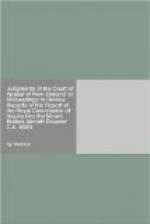In its essentials the argument is that in order to answer the questions posed by paragraph (g) the Commissioner found it necessary or was entitled to explain the process by which he reached his final conclusions; that in doing so he was entitled to comment upon the quality of the evidence that was given in the course of the Royal Commission Inquiry; that the assessment of witnesses was a necessary part of the findings he reached as to the cause of the accident; that the assessment was not a part of the substantive findings of the Commission; and “whether having reached his conclusion he expresses himself vehemently or refrains from pungent comment is entirely a matter for him”. Similar submissions were made in relation to the second cause of action and natural justice.
In certain circumstances it is obvious enough that reasons for rejecting evidence would not merely be relevant but often a necessary part of a decision. But considerations of that kind are far removed from the conclusions expressed in paragraph 377. There it is said that the ten senior members of this airline had been involved in organized deception. “Palpably false sections of evidence ... a pre-determined plan of deception ... an attempt to conceal a series of disastrous administrative blunders ... an orchestrated litany of lies”. These are unlikely phrases to associate with a mere assessment of the credibility of witnesses.
In the Courts it is constantly necessary to indicate a preference for the evidence of one witness or to make a decision to put evidence completely to one side; sometimes it even seems necessary to describe evidence in terms of perjury. But in the Courts Judges always attempt to be most circumspect in handling issues of this kind, particularly if misconduct seems apparent which is not immediately associated with the central issues in the case. There can be no less reason for circumspection in the case of a Royal Commission at least where the terms of reference do not directly give rise to inquiries into criminal dealing. In Re The Royal Commission on Licensing (1945) N.Z.L.R. 665 Sir Michael Myers C.J. dealt with the point in the following way (at p. 680):
“A Commission of Inquiry under the statute and a Royal Commission under the Letters Patent are alike in this respect—each of them is an inquiry, not an inquisition. By that I mean that the Commission is not a roving Commission of a general character authorizing investigation into any matter that the members of the Commission may think fit to inquire into and that the ambit of the inquiry is limited by the terms of the instrument of appointment of the Commission.”
It must always be sensible for any Commission of Inquiry or other tribunal to keep those words in mind.




